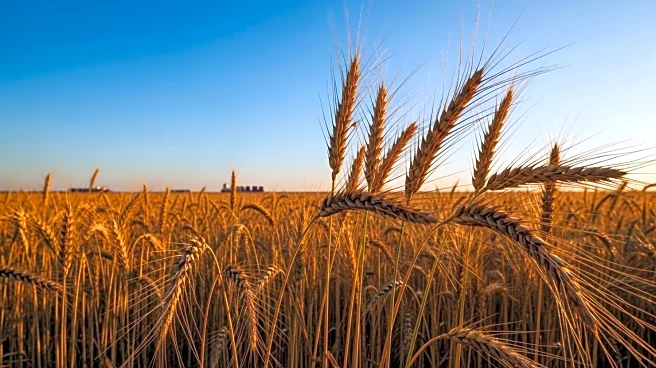What's Happening?
Argus Media, a commodities data company, has projected a significant increase in French soft wheat stocks and exports for the 2025/26 season. France, the European Union's largest grain producer, has completed its harvest with an estimated crop yield of 33.4 million tonnes, marking a 30% increase over the previous year's wet conditions. Despite this recovery, France is expected to end the season with its largest stockpile of soft grain in two decades, totaling 4 million tonnes. The anticipated recovery in exports is driven by stable demand in Europe and the United States, with a need to export heavily to third countries to balance the supply. Argus forecasts that French soft wheat exports to the EU will reach 8 million metric tonnes, although this projection is described as ambitious due to declining sales in Algeria and China.
Why It's Important?
The increase in French soft wheat stocks and exports has significant implications for global agricultural markets. France's ability to export surplus wheat is crucial for maintaining market balance, especially given the abundance of global supply. The projected increase in exports could impact wheat prices and trade dynamics, particularly in regions like Egypt and Southeast Asia, where recent sales have demonstrated additional demand. The situation underscores the challenges faced by producers in managing large stockpiles while navigating fluctuating international demand. Stakeholders in the agricultural sector, including farmers and exporters, may benefit from increased trade opportunities, while consumers could see price adjustments based on supply changes.
What's Next?
France will need to focus on expanding its export markets to manage the large stockpile effectively. This includes targeting non-EU countries to achieve the necessary export levels. The French farm office, FranceAgriMer, has projected that exports will double this season, reaching 7.5 million tonnes, while stocks will rise significantly. The success of these efforts will depend on global demand trends and France's ability to compete with other major wheat producers. Monitoring these developments will be crucial for stakeholders in the agricultural industry, as they could influence future planting decisions and trade policies.
Beyond the Headlines
The situation highlights broader issues related to agricultural sustainability and climate resilience. The increase in production following a wet season suggests that weather patterns continue to play a critical role in crop yields. As climate change impacts become more pronounced, producers may need to adopt more resilient farming practices to mitigate risks associated with extreme weather events. Additionally, the reliance on exports to manage surplus stock raises questions about the long-term viability of current agricultural strategies and the need for diversification in crop production.











